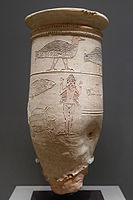
Photo from wikipedia
The verb הֵעִיד in Biblical Hebrew is understood by most scholars primarily within the semantic field of עֵד, “witness.” However, many of its biblical occurrences do not befit this reading.… Click to show full abstract
The verb הֵעִיד in Biblical Hebrew is understood by most scholars primarily within the semantic field of עֵד, “witness.” However, many of its biblical occurrences do not befit this reading. These were interpreted according to the context, as bearing the meaning of: “to warn,” “to assure,” “to command.” Explaining the connection between all aspects of the verb poses a challenge. The present paper argues that all these meaning are in fact interrelated: they all derive from the meaning of הֵעִיד (and the verbal phrase הֵעִיד בְּ) as implying the imposition of an oath. Oaths are based on the summoning of divine witnesses as guarantors of the sworn undertakings. Convocation of witnesses thus became associated with oaths, and consequently הֵעִיד developed a secondary meaning of imposing an oath. Understanding the verb הֵעִיד as implying the imposition of an oath will reconcile the various meanings attributed to this verb, and unveil the internal links between them.
Journal Title: Vetus Testamentum
Year Published: 2021
Link to full text (if available)
Share on Social Media: Sign Up to like & get
recommendations!